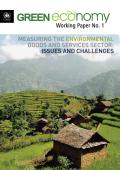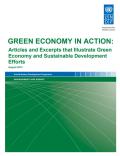This report highlights the main outcomes of the European Union Water Initiative (EUWI) in the Eastern Europe, the Caucasus and Central Asia (EECCA) countries. Section 2 highlights specific achievements at the country level in the context of national policy dialogues facilitated by the OECD and UNECE. Section 3 focuses on water diplomacy, highlighting progress in the context of transboundary water management and the regional dimension of the EUWI EECCA. Section 4 looks ahead and suggests avenues for future work in the region, highlighting where the input of the EUWI and EU member states can make a difference. Section 5 describes how National Policy Dialogues work as a process for achieving policy reform. In addition, country fiches highlight in more detail specific achievements at country level in the context of national policy dialogues facilitated by the OECD and UNECE.
This policy manuel aims to help the European Union’s Eastern Partnership (EaP) countries – Armenia, Azerbaijan, Belarus, Georgia, Moldova and Ukraine – design or reform economic instruments related to environmentally harmful products. Within the broad range of economic instruments to promote greener growth, this manual addresses instruments directed at changing consumer purchasing behaviour (product taxes) and those targeting improvements in waste generation and management (deposit-refund systems and extended producer responsibility schemes). The main target audience of this policy manual includes government stakeholders (ministries of environment, economy and finance) as well as business communities, non-governmental and academic institutions in EaP countries.

As an increasing number of countries adopt green economy strategies, there is a need to support them in measuring the magnitude of this new economy. This papers aims to guide them in this discussion. An Environmental Goods and Services Sector (EGSS) framework is a vital instrument for facilitating the greening of the economy, as it encompasses the two priority areas for green economy indicator development, namely the greening of conventional economic activities and the growing share of green or environment-related sectors.

The Green Economy is one in which the vital linkages among the economy, society, and environment are taken into account. This selection of articles and excerpts emerged in response to the need to fill the knowledge gap on practical, concrete, and on the ground green economy country experience. It is in this spirit that the articles and excerpts included in this publication have been selected: to provide information and knowledge for policy and decision makers and practitioners on the positive implications of greening some priority sectors, including job creation, resource efficiency, and generally contribution to sustainable development through an extensive review of scientific publications and magazines.
The sectors analysed are water, agriculture, energy, industry, business, ecosystems, technology, waste management. The report contains several case studies, including from China, Egypt, the United Arab Emirates, the United Kingdom and Europe.
Green Growth examines the impact of wind energy on jobs and the economy in the EU. The wind energy industry increased its contribution to the EU’s gross domestic product (GDP) by 33% between 2007 and 2010. In 2010, the industry’s growth was twice that of the EU’s GDP overall, with the sector contributing €32 billion to an EU economy in slowdown. Contents: The sector created 30% more jobs from 2007 to 2010 to reach nearly 240,000, while EU unemployment rose by 9.6% . By 2020, there should be 520,000 jobs in the sector. The sector was a net exporter of €5.7 billion worth of goods and services in 2010. The sector avoided €5.71 billion of fuel costs in 2010. The sector invested 5% of its spending in R&D – three times more than the EU average. Wind turbine manufacturers commit around 10% of their total turnover to R&D.
